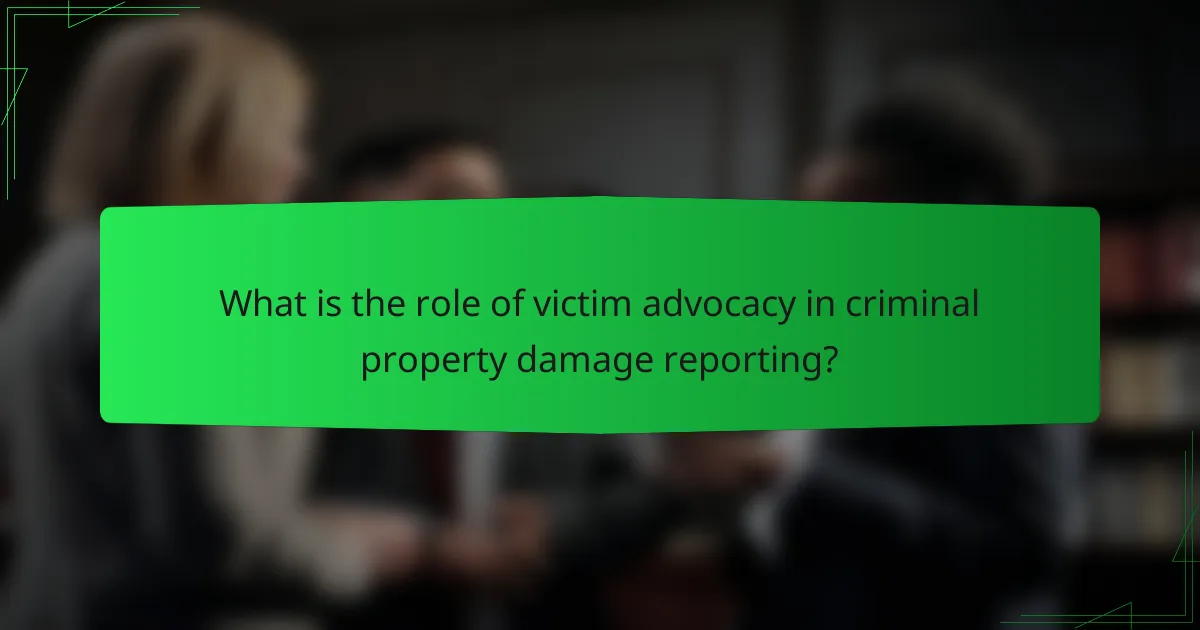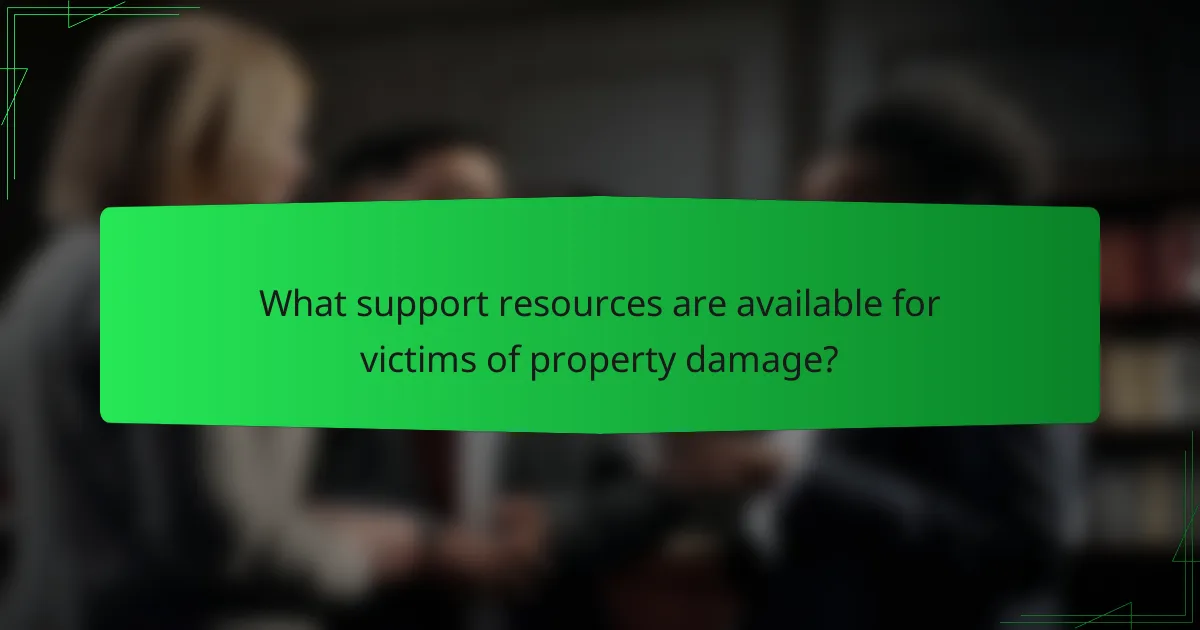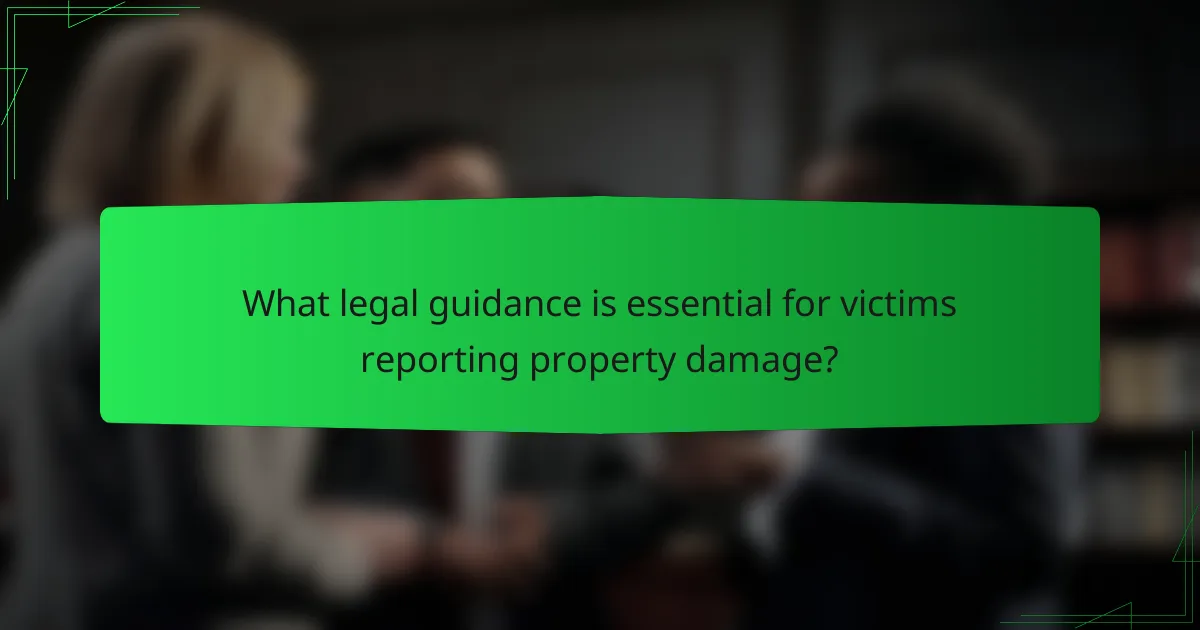Victim advocacy is essential in the context of criminal property damage reporting, as it provides vital support and guidance to victims during a challenging period. Advocates assist victims in understanding their rights, navigating legal options, and completing necessary paperwork, thereby reducing emotional distress. Various resources are available to victims, including local law enforcement, community organizations, and legal aid services, which help with recovery, restitution, and filing claims. Additionally, victims are encouraged to document damage thoroughly and consult legal professionals to ensure they understand their rights and the statutes of limitations related to property damage claims. Overall, effective victim advocacy enhances reporting rates and victim satisfaction within the criminal justice system.

What is the role of victim advocacy in criminal property damage reporting?
Victim advocacy plays a crucial role in criminal property damage reporting. Advocates provide support and guidance to victims throughout the reporting process. They help victims understand their rights and the legal options available to them. This support can alleviate the emotional distress often associated with property damage incidents.
Advocates may assist in completing necessary paperwork and communicating with law enforcement. They also offer resources for recovery and restitution. Research shows that effective victim advocacy can improve reporting rates and enhance victim satisfaction with the criminal justice process. Overall, victim advocacy ensures that victims feel heard and supported during a challenging time.
How do victim advocates assist individuals reporting property damage?
Victim advocates assist individuals reporting property damage by providing emotional support and practical guidance. They help victims understand their rights and the reporting process. Advocates can assist with filling out necessary paperwork and documentation. They also connect victims with local resources, such as legal assistance and counseling services. Furthermore, victim advocates may offer information on how to file insurance claims effectively. Their involvement can reduce the stress associated with the reporting process. Studies show that victims who receive advocacy support report higher satisfaction with the justice process. This support can lead to improved outcomes for victims navigating property damage cases.
What specific services do victim advocates provide during the reporting process?
Victim advocates provide emotional support, guidance, and assistance throughout the reporting process. They help victims understand their rights and options. Advocates can accompany victims to law enforcement agencies. They offer information on how to file a report effectively. Victim advocates also assist in gathering necessary documentation. They provide resources for additional support services, like counseling. Advocates ensure victims feel safe and respected during interactions with authorities. Their involvement can improve the likelihood of a successful reporting experience.
How can victim advocates help navigate the emotional impact of property damage?
Victim advocates can provide emotional support to individuals experiencing property damage. They offer counseling to help victims process their feelings of loss and trauma. Advocates facilitate access to mental health resources, which can aid in coping with emotional distress. They also provide information about the recovery process, helping victims understand their rights and options. By connecting victims with community resources, advocates can alleviate feelings of isolation. Furthermore, they assist in developing coping strategies tailored to individual needs. This support can be crucial in restoring a sense of normalcy and stability in the aftermath of property damage.
Why is victim advocacy important in the context of criminal property damage?
Victim advocacy is crucial in the context of criminal property damage because it provides essential support and guidance to affected individuals. Victims often experience emotional distress and confusion after property damage incidents. Advocacy services help victims understand their rights and navigate the legal system. They can assist in reporting the crime and seeking restitution. Studies show that victims who receive support are more likely to engage in the reporting process. Effective advocacy can lead to better outcomes in terms of recovery and justice. Furthermore, victim advocates can connect individuals with resources for emotional and financial support. This holistic approach enhances the victim’s overall well-being and empowers them in the aftermath of crime.
What are the potential challenges victims face when reporting property damage?
Victims face several challenges when reporting property damage. One significant challenge is the emotional distress caused by the incident. This distress can hinder clear communication with authorities. Another challenge is the lack of knowledge about the reporting process. Victims may not understand what information is required or how to document damage properly. Additionally, victims might face skepticism from law enforcement. This skepticism can discourage them from filing a report. Limited access to resources can also pose a challenge. Some victims may not have the means to gather necessary evidence or seek legal assistance. Furthermore, fear of retaliation can prevent victims from coming forward. These challenges can complicate the reporting process and impact the victim’s ability to seek justice.
How does victim advocacy improve the reporting experience for victims?
Victim advocacy improves the reporting experience for victims by providing essential support and guidance. Advocates help victims navigate the reporting process, making it less intimidating. They offer emotional support, which can reduce anxiety during reporting. Additionally, advocates ensure that victims understand their rights and options. This knowledge empowers victims to make informed decisions. Research shows that victims with advocacy support report feeling more satisfied with the process. Studies indicate that advocacy can lead to higher reporting rates and better cooperation with law enforcement. Overall, victim advocacy fosters a more positive and supportive environment for those reporting crimes.

What support resources are available for victims of property damage?
Victims of property damage can access various support resources. Local law enforcement agencies often provide immediate assistance and guidance. Community organizations may offer financial aid for repairs and legal assistance. Insurance companies also play a crucial role in helping victims file claims. Non-profit organizations, like the Red Cross, may provide temporary housing and essentials. Legal aid services can assist with navigating the legal process. Additionally, support hotlines offer emotional support and resources. These resources are crucial for recovery and rebuilding after property damage incidents.
What types of organizations offer support to victims of property damage?
Nonprofit organizations, government agencies, and community groups offer support to victims of property damage. Nonprofit organizations, such as the American Red Cross, provide emergency assistance and recovery resources. Government agencies may offer financial aid and legal assistance to affected individuals. Community groups often facilitate local support networks and resources. These organizations work together to help victims navigate the recovery process. They provide essential services like counseling, financial support, and legal guidance. Research indicates that access to these resources significantly aids in the recovery of victims.
How can local non-profits assist victims in the aftermath of property damage?
Local non-profits can assist victims in the aftermath of property damage by providing essential resources and support services. They often offer emergency financial assistance to help victims cover immediate costs. Many non-profits facilitate access to temporary housing for those displaced by property damage. They also provide emotional support through counseling services to help victims cope with trauma.
Additionally, local non-profits can assist with the coordination of volunteer efforts for cleanup and repairs. They may offer legal assistance to help victims navigate insurance claims and understand their rights. Many organizations also connect victims with community resources, such as food banks and clothing donations. These efforts collectively aid in the recovery process for victims of property damage.
What role do law enforcement agencies play in supporting victims?
Law enforcement agencies play a crucial role in supporting victims of crime. They provide immediate assistance during emergencies and ensure the safety of victims. Officers are trained to respond sensitively to victims’ needs. They often connect victims with resources such as counseling and legal assistance. Law enforcement agencies also facilitate the reporting process for victims. This ensures that incidents are documented accurately for legal proceedings. Furthermore, agencies may offer victim advocacy programs to help navigate the justice system. According to the Bureau of Justice Statistics, effective victim support can lead to increased reporting and cooperation with law enforcement.
What financial resources are accessible to victims of property damage?
Victims of property damage have access to several financial resources. Insurance claims are a primary source of compensation for damages incurred. Homeowners or renters insurance policies typically cover property damage. Additionally, federal disaster relief funds may be available for victims of natural disasters. Local government assistance programs often provide financial aid for property restoration. Nonprofit organizations may offer grants or financial help for specific situations. Legal aid services can assist victims in pursuing compensation from responsible parties. Community funds and crowdfunding platforms may also support victims financially.
How can victims apply for financial assistance or grants?
Victims can apply for financial assistance or grants through various programs. They should first identify the specific assistance programs available in their state or locality. Many states have victim compensation funds that cover expenses related to crime. Victims can typically access these funds by submitting an application form. This form often requires documentation of the crime and associated costs. Some organizations also provide grants for victims of specific types of crimes. Victims should gather necessary evidence and complete all required forms accurately. Additionally, seeking help from victim advocacy groups can facilitate the application process. These groups often provide guidance and support to navigate the application requirements.
What insurance options are available to cover property damage?
Homeowners insurance provides coverage for property damage. This insurance typically covers damage from fire, theft, and certain natural disasters. Renters insurance also offers protection for personal property against similar risks. Additionally, commercial property insurance covers damage to business assets. Flood insurance specifically addresses damage from flooding, which is not included in standard policies. Earthquake insurance is another option for those in seismic zones. Each policy type varies in coverage limits and exclusions. Understanding these options helps property owners select appropriate protection.

What legal guidance is essential for victims reporting property damage?
Victims reporting property damage should seek legal guidance to understand their rights and options. They must document the damage thoroughly, including photographs and written descriptions. It is crucial to file a police report to create an official record. Victims should also review their insurance policies to determine coverage for property damage. Consulting with a lawyer can help clarify legal responsibilities and potential claims. Additionally, victims should be aware of statutes of limitations for filing claims. Understanding local laws regarding property damage is essential for effective reporting. Legal resources and victim advocacy groups can provide support throughout the process.
What legal rights do victims have when reporting property damage?
Victims have the legal right to report property damage to law enforcement. This right includes the ability to file a police report detailing the incident. Victims can seek assistance from victim advocacy groups during this process. They are entitled to receive updates on the status of their case. Victims may also request protection orders if they feel threatened. In many jurisdictions, victims have the right to restitution for damages incurred. Laws vary by state, but generally, victims can access legal resources for guidance. These rights aim to ensure victims are supported and informed throughout the reporting process.
How can victims ensure their rights are protected during the reporting process?
Victims can ensure their rights are protected during the reporting process by being informed about their legal rights. Understanding local laws and regulations is crucial. Victims should document all interactions with law enforcement. This includes taking notes and keeping copies of any reports filed. Seeking assistance from a victim advocacy organization can provide additional support and guidance. These organizations can help victims navigate the reporting process. Additionally, victims should request updates on their case from law enforcement. This keeps them informed and engaged in the process. Knowing the right to legal representation is also important. Victims can consult with an attorney to understand their rights fully.
What legal recourse is available to victims if their property damage is not addressed?
Victims of unaddressed property damage can pursue legal recourse through several avenues. They may file a civil lawsuit against the responsible party for damages. This process involves gathering evidence to support their claim. Victims can seek compensation for repair costs, loss of use, and other related expenses.
Additionally, victims may report the incident to law enforcement. This can lead to criminal charges against the perpetrator. If a crime is established, victims might also be eligible for restitution through the criminal justice system.
Consulting with a legal professional can provide guidance on the best course of action. Legal professionals can help navigate the complexities of property damage claims. They can also assist in understanding local laws and regulations that may apply.
How can victims effectively communicate with law enforcement and legal representatives?
Victims can effectively communicate with law enforcement and legal representatives by being clear and concise. They should prepare their statements in advance, focusing on key details. Providing specific information such as dates, times, and locations is crucial. Victims should also express their emotions and the impact of the crime on their lives. Asking questions can clarify processes and expectations. Utilizing victim advocacy services can enhance communication effectiveness. Research indicates that informed victims are more likely to engage positively with legal systems.
What information should victims prepare before meeting with law enforcement?
Victims should prepare specific information before meeting with law enforcement. This includes details about the incident, such as the date, time, and location. Victims should also gather a description of the suspect, if known, including physical appearance and clothing. Documenting any witnesses’ names and contact information is crucial. Victims should compile evidence, such as photographs or videos of the damage. Keeping a record of any communication with law enforcement or other agencies is important. Having personal identification and any relevant documents ready can facilitate the process. Preparing this information can help law enforcement effectively investigate the case.
How can victims articulate their needs to legal representatives effectively?
Victims can articulate their needs to legal representatives effectively by clearly expressing their concerns and expectations. They should prepare a list of specific issues they want addressed. This includes detailing the incident and its impact on their lives. Victims should communicate their desired outcomes, such as financial compensation or emotional support. Using simple and direct language helps ensure clarity. Additionally, victims can provide documentation to support their claims. This may include police reports, medical records, or photographs of damage. Engaging in open dialogue fosters understanding between victims and legal representatives. Active participation in meetings can also enhance communication.
What best practices should victims follow when reporting property damage?
Victims should document all property damage thoroughly when reporting. Take clear photographs of the damage from multiple angles. Record the date and time of the incident for accurate reporting. Gather witness statements if possible, as they can support your claim. Contact local authorities to file a report promptly. Provide them with all documented evidence. Keep copies of all correspondence related to the report. Follow up with authorities to ensure your report is processed. These steps help ensure a comprehensive and effective reporting process.
How can victims document their property damage effectively?
Victims can document their property damage effectively by taking clear photographs of the damage. They should capture multiple angles to provide a comprehensive view. Written descriptions of the damage should accompany the photographs. Victims should also gather any relevant receipts or invoices for repairs. Keeping a detailed record of dates and times of the damage is important. Witness statements can further support their claims. This thorough documentation can assist in insurance claims and legal processes. Accurate documentation is crucial for establishing the extent of the damage.
What steps should victims take immediately after experiencing property damage?
Victims should first ensure their safety after experiencing property damage. They must assess the situation for any immediate dangers. If necessary, they should contact emergency services for medical assistance or fire response. Next, victims should document the damage thoroughly. This includes taking photographs and making notes of the incident details. They should also report the damage to local authorities as soon as possible. Filing a police report is crucial for legal documentation. Victims should then notify their insurance company to initiate the claims process. Keeping records of all communications and expenses related to the damage is important for future reference.
The main entity of this article is victim advocacy in the context of criminal property damage reporting. The article outlines the essential role victim advocates play in supporting individuals affected by property damage, including emotional support, guidance through the reporting process, and assistance with legal rights and resources. It discusses specific services provided by advocates, the challenges victims face, and the importance of advocacy in improving reporting experiences and outcomes. Additionally, the article highlights available support resources, financial assistance options, and best practices for victims when reporting property damage.